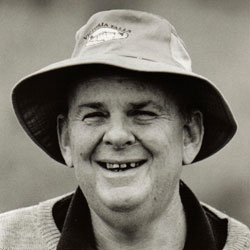The word goes round Repins,
the murmur goes round Lorenzinis,
at Tattersalls, men look up from sheets of numbers,
the Stock Exchange scribblers forget the chalk in their hands
and men with bread in their pockets leave the Greek Club:
There’s a fellow crying in Martin Place. They can’t stop him.
The traffic in George Street is banked up for half a mile
and drained of motion. The crowds are edgy with talk
and more crowds come hurrying. Many run in the back streets
which minutes ago were busy main streets, pointing:
There’s a fellow weeping down there. No one can stop him.
The man we surround, the man no one approaches
simply weeps, and does not cover it, weeps
not like a child, not like the wind, like a man
and does not declaim it, nor beat his breast, nor even
sob very loudly – yet the dignity of his weeping
holds us back from his space, the hollow he makes about him
in the midday light, in his pentagram of sorrow,
and uniforms back in the crowd who tried to seize him
stare out at him, and feel, with amazement, their minds
longing for tears as children for a rainbow.
Some will say, in the years to come, a halo
or force stood around him. There is no such thing.
Some will say they were shocked and would have stopped him
but they will not have been there. The fiercest manhood,
the toughest reserve, the slickest wit amongst us
trembles with silence, and burns with unexpected
judgements of peace. Some in the concourse scream
who thought themselves happy. Only the smallest children
and such as look out of Paradise come near him
and sit at his feet, with dogs and dusty pigeons.
Ridiculous, says a man near me, and stops
his mouth with his hands, as if it uttered vomit –
and I see a woman, shining, stretch her hand
and shake as she receives the gift of weeping:
as many as follow her also receive it
and many weep for sheer acceptance, and more
refuse to weep for fear of all acceptance,
but the weeping man, like the earth, requires nothing,
the man who weeps ignores us, and cries out
of his writhen face and ordinary body
not words, but grief, not messages, but sorrow,
hard as the earth, sheer, present as the sea –
and when he stops, he simply walks between us
mopping his face with the dignity of one
man who has wept, and now has finished weeping.
Evading believers, he hurries off down Pitt Street.
Notes on the Poem
Let's simply pause and take in Les Murray's "An Absolutely Ordinary Rainbow", a poem from his collection Learning Human, which was shortlisted for the inaugural Griffin Poetry Prize in 2001. We enjoy examining every Poem of the Week, taken from anthologized selections from the Griffin Poetry Prize shortlisted works. We hope our fellow poetry lovers find it elucidating and intriguing to come at each poem from different perspectives - none overly technical or obscure - from a poem's subject matter and themes to its structure, effects, inspirations, antecedents and more. Sometimes we just want to skip the analyses, though, and just savour the poem, its storytelling and the feelings it evokes. We can take it at face value or at whatever level the poem captures our attention. Murray's poem is perfect for this, and we can approach it from the many different angles from which the crowds approach the enigmatic weeping man. If you like, you can listen to this fine reading of the poem as you absorb the words on the screen (or on the page, if you have Learning Human or the 2001 Griffin Poetry Prize anthology): "Whether he’s running a marathon or the hundred meters, Murray gives us beauty and bounty in equal measures,” observed the 2001 Griffin Poetry Prize judges in their citation for Learning Human. This poem fits that assertion well.

When one looks at how our so called leaders are behaving the wonder is that we are not all weeping.